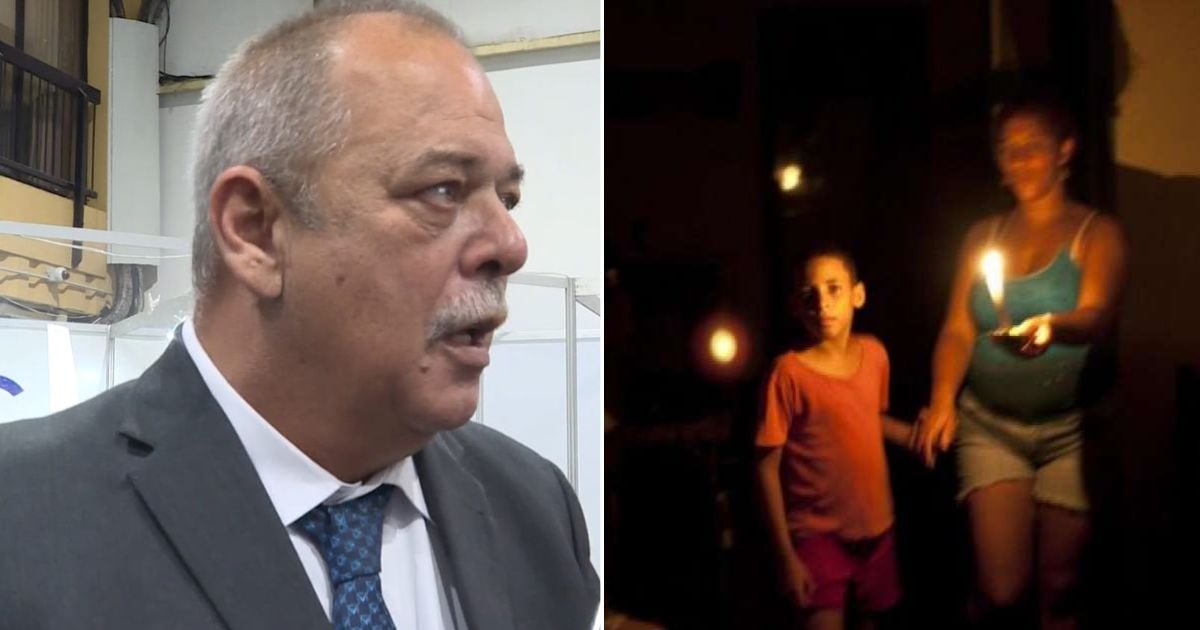The Cuban Minister of Energy and Mines, Vicente de la O Levy, addressed the critical state of the National Electrical System (SEN) this Wednesday, which has been plagued by constant power outages. He assured that the fuel needed to alleviate the crisis "is in Cuban ports" but has yet to be unloaded.
Official journalist Lázaro Manuel Alonso shared the Minister's statements on Facebook, ironically during the inauguration of the Third International Renewable Energy Fair. Vicente de la O Levy stated that the fuel "is in Cuban ports on the ships" and that a solution for its unloading is imminent, all while the population continues to endure daily blackouts and a power generation deficit that exceeded 1,300 MW this Tuesday.
The Minister highlighted that in a "financial sacrifice for the country," the unloading of the fuel is planned between Wednesday and Thursday, presenting it as a significant achievement that "high amounts of money are paid weekly." Despite these "good news," the much-needed relief will not arrive immediately, as the Minister clarified that "after unloading, the process of transporting it to the power generators and gas stations will begin."
Furthermore, Vicente de la O Levy attempted to justify the crisis by explaining that "Cuba consumes 3,000 tons of hydrocarbons daily. A 20,000-ton ship lasts one week. Two to three ships are needed over seven days to supply diesel, gasoline, liquefied gas, fuel oil, and jet fuel," something he deemed impossible due to Cuba's "restricted" economy, dampening any hope for improvement.
In addition to the fuel shortage, the worsening of the current SEN crisis is marked by the shutdown of several generating units due to breakdowns. According to the Ministry of Energy, the Mariel 8 thermoelectric plant in Artemisa is scheduled to rejoin on Thursday, while the Diez de Octubre 5 unit in Camagüey could be ready in four or five days after repairing leaks in its boiler.
However, the Céspedes 4 thermoelectric plant in Cienfuegos failed to rejoin on Tuesday, and La Habana 1 in Mayabeque expects to be operational by Friday after repairing its pipes. The energy crisis in Cuba is deepening, with power outages lasting longer each day across all provinces.
As of 7:00 am this Wednesday, the availability of the National Electrical System (SEN) was 1830 MW, with a demand of 2790 MW, resulting in 959 MW being affected. By noon, a greater impact of 1150 MW was anticipated. During peak hours, the deficit will be 1320 MW, with a 1390 MW impact.
Six blocks of the CTE Mariel, Santa Cruz, Nuevitas, Felton, and Rente plants are out of service due to breakdowns. Additionally, 59 distributed generation centers are offline due to lack of fuel (582 MW affected), and thermal generation limitations amount to 424 MW.
Understanding the Cuban Energy Crisis
To provide further insight into the ongoing energy crisis in Cuba, here are some frequently asked questions and their answers.
Why is the fuel stuck in Cuban ports?
The fuel is stuck in Cuban ports due to logistical issues and the financial difficulties the country faces in unloading and transporting it to the necessary locations.
How much fuel does Cuba consume daily?
Cuba consumes 3,000 tons of hydrocarbons daily, requiring two to three 20,000-ton ships per week to meet the demand.
What are the main causes of the power outages in Cuba?
The main causes of the power outages are the lack of fuel and the breakdown of several generating units, which have not been adequately maintained or repaired.
What measures are being taken to resolve the energy crisis?
The government plans to unload the fuel currently in ports and transport it to power generators and gas stations, in addition to repairing broken generating units.
